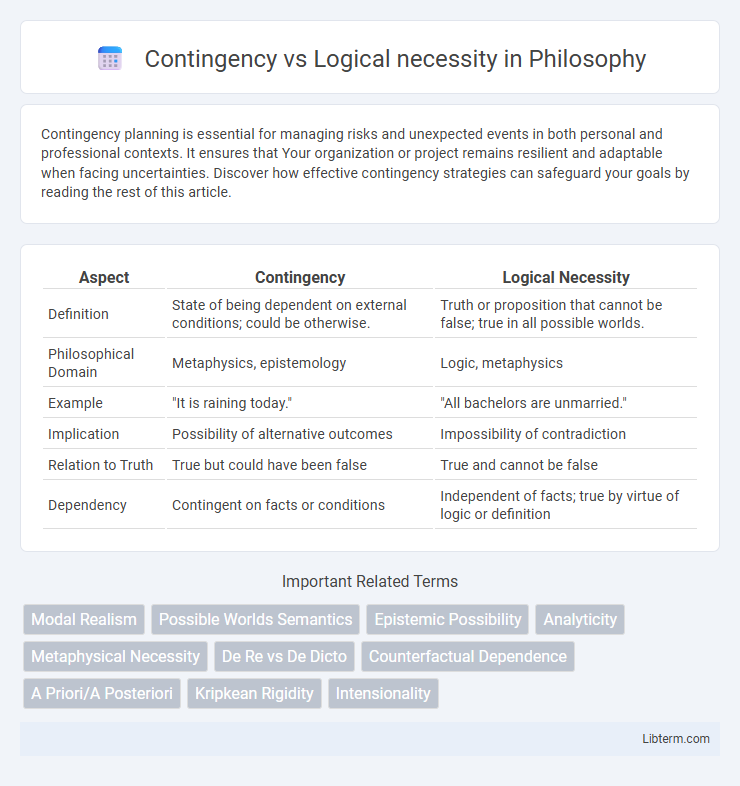Contingency planning is essential for managing risks and unexpected events in both personal and professional contexts. It ensures that Your organization or project remains resilient and adaptable when facing uncertainties. Discover how effective contingency strategies can safeguard your goals by reading the rest of this article.
Table of Comparison
| Aspect | Contingency | Logical Necessity |
|---|---|---|
| Definition | State of being dependent on external conditions; could be otherwise. | Truth or proposition that cannot be false; true in all possible worlds. |
| Philosophical Domain | Metaphysics, epistemology | Logic, metaphysics |
| Example | "It is raining today." | "All bachelors are unmarried." |
| Implication | Possibility of alternative outcomes | Impossibility of contradiction |
| Relation to Truth | True but could have been false | True and cannot be false |
| Dependency | Contingent on facts or conditions | Independent of facts; true by virtue of logic or definition |
Introduction to Contingency and Logical Necessity
Contingency refers to statements or propositions that could be true or false depending on circumstances, relying on empirical evidence or situational factors. Logical necessity involves propositions that must be true in all possible worlds due to their inherent logical form, independent of external conditions. Understanding the distinction helps clarify philosophical debates on truth, necessity, and possibility.
Defining Contingent Propositions
Contingent propositions are statements whose truth value depends on specific conditions or states of affairs, making them true in some possible worlds and false in others. Unlike logical necessities, which are true in all conceivable scenarios due to their inherent logical form, contingent propositions require empirical verification or particular circumstances to hold true. This distinction highlights the essential difference between propositions that express necessary truths and those that are conditioned by external facts.
Understanding Logical Necessity
Logical necessity refers to statements or propositions that are true in all possible worlds due to their logical form, such as "All bachelors are unmarried." Understanding logical necessity involves recognizing that these truths cannot be otherwise without contradiction, as their validity depends solely on the meanings of the terms and logical structure rather than empirical facts. This contrasts with contingency, where truths depend on specific states of the world and could be false under different circumstances.
Historical Perspectives on Necessity and Contingency
Historical perspectives on necessity and contingency trace back to classical philosophy, where Aristotle distinguished between things that are necessary in themselves and those that are contingent upon external causes. Medieval thinkers like Thomas Aquinas further developed this by linking necessity to God's nature, while contingency was associated with created beings subject to change. Enlightenment philosophers challenged these views by emphasizing empirical observation, leading to modern debates on metaphysical necessity versus logical contingency in modal logic and analytic philosophy.
Contingency in Philosophy and Science
Contingency in philosophy refers to events or propositions that are neither necessarily true nor necessarily false, implying their truth value depends on external factors or conditions. In science, contingency highlights the dependence of outcomes on specific circumstances, emphasizing that natural laws operate within contexts that may produce varying results. This concept challenges deterministic views by acknowledging the role of chance, historical events, and environmental influences in shaping phenomena.
Modal Logic: Tools for Analyzing Necessity
Modal logic provides a framework for distinguishing between contingency and logical necessity by using modal operators to express possibility and necessity. Contingent propositions hold true in some possible worlds but not all, whereas logically necessary propositions are true in every conceivable world, reflecting their intrinsic logical validity. This distinction enables precise analysis of necessity in philosophy, mathematics, and computer science through formal systems like Kripke semantics and S5 modal logic.
Examples of Contingent and Necessary Truths
Contingent truths depend on specific conditions or states of the world, such as "The sky is blue" or "Water boils at 100degC at sea level," which could be otherwise under different circumstances. Necessary truths hold universally and cannot be false, exemplified by mathematical statements like "2+2=4" or logical tautologies such as "All bachelors are unmarried men." Understanding the distinction helps clarify modal logic and metaphysical discussions about possibility and necessity.
The Relationship Between Contingency and Possibility
Contingency refers to propositions or events that are neither necessarily true nor necessarily false, existing within the realm of possibility rather than certainty. Logical necessity entails statements that must be true under all possible circumstances, reflecting absolute certainty. The relationship between contingency and possibility lies in the fact that contingencies are possible but not mandated, indicating a dependence on conditions that could vary, while logical necessities transcend such variability by holding true in every possible world.
Implications for Metaphysics and Epistemology
Contingency and logical necessity play crucial roles in metaphysics and epistemology by shaping the nature of existence and knowledge. Contingent truths depend on external facts and allow for alternative possibilities, impacting metaphysical debates about the necessity of entities and states of affairs. Logical necessity, defining truths that hold in all possible worlds, underpins epistemic justification and modal reasoning, influencing how certainty and a priori knowledge are understood in philosophy.
Conclusion: The Importance of Distinguishing Necessity from Contingency
Distinguishing necessity from contingency is crucial for understanding the nature of truth and existence in metaphysics. Necessity refers to truths that hold in all possible worlds, while contingency applies to facts that could be otherwise, impacting philosophical arguments and modal logic. Recognizing this distinction informs debates on causality, determinism, and the limits of human knowledge.
Contingency Infographic

 libterm.com
libterm.com